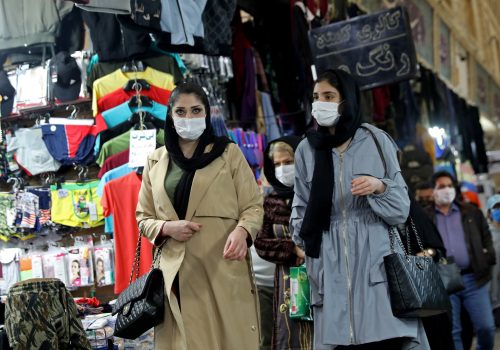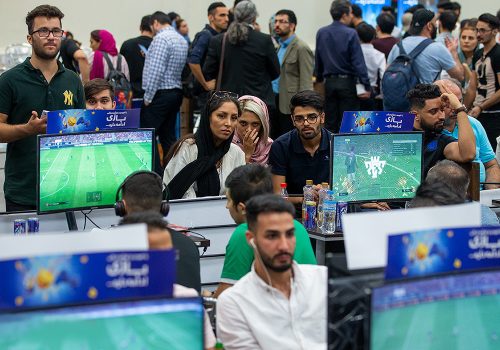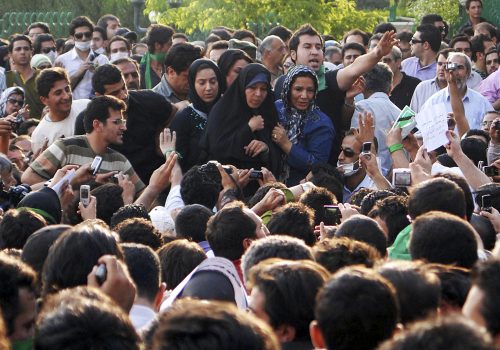A look at Iran’s new First Lady
Historically, the wives of Iranian presidents have not been active in public, but since the 2009 presidential election, the wives of candidates have been entering the spotlight.
With the June 18 presidential election engineered by the Guardian Council (a vetting body) to give hardline Judiciary Chief Ebrahim Raisi a win despite the lowest turnout in the Islamic Republic’s history with 48.8 percent of the vote, it’s important to take a close look at his wife and, more importantly, how the couple will impact women’s rights in Iran.
Jamileh Alamolhoda was born in 1965 to a prominent ultra-conservative clerical family in the holy city of Mashhad. She is the daughter of Ayatollah Ahmad Alamolhoda, the Friday Prayer imam of Mashhad and the Supreme Leader’s representative in Khorasan province. Alamolhoda’s father is also a member of the Assembly of Experts, an eighty-eight-member clerical body tasked with appointing the Supreme Leader.
In 1983, when Alamolhoda was just eighteen-years-old, she married Raisi. Together, they have two daughters. While married, Alamolhoda got her bachelor’s degree in midwifery. Alamolhoda then switched to studying education and received a PhD in educational sciences from Tarbiat Moddares University.
In 2015, Alamolhoda said that she believes “Humanity and social sciences grow in the context of civilization that contrasts with Islamic civilization, which has a huge impact in all cultural and epistemological areas of Islamic society. However, social science experts have not been ready to expand Islamic science and knowledge.” Like her father, Alamolhoda has been engaged in supporting the growth of Islamic science—examining social issues from an Islamic perspective—which explains why she founded and chairs Shahid Beheshti University’s Institute for Science and Technology Studies. She is also the author of the book, Islamic Theory of Human Development.
It might seem surprising that a woman from such a traditional and conservative family is educated. However, education for men and women has been encouraged since the 1979 Islamic Revolution—albeit with some hurdles for Iranian women. In 2019, women constituted 47.6 percent of the student body in higher education, a number that has dropped significantly in recent years.
The push for education under the Islamic Republic may have something to do with a dictate from Imam Ali to “seek education even if it is in China”—China being metaphorically far from Iraq, where the first Shia imam lived fourteen centuries ago.
This perhaps might be the logic behind why Alamolhoda was allowed by her husband to continue her tertiary education. When Raisi ran as the leading hardline candidate against incumbent Hassan Rouhani in 2017, he said in an interview, “When we first got married, my wife wanted very much to study. She asked me whether I’d let her study. I said ‘definitely.’”
Despite studying educational science, Alamolhoda’s outlook is rooted in family tradition and conservatism, meaning that she believes a woman’s role is to be a mother and wife first and foremost.
When Raisi decided to run in 2017, Alamolhoda allegedly passed out upon hearing his decision. Nevertheless, she became somewhat of a vocal candidate-spouse.
During a campaign rally, Alamolhoda said that “womanhood is lost and women behave like men” and that it was the “legacy of Western civilization.” She further added: “There is no gender but parity and being a couple. [The West] needed women’s labor so they told women to become workers too.”
Affirming her conservative views during the 2017 race, Alamolhoda stated that the “election is a scene of a fight between two streams of thought on women’s rights and women’s issues. One stream of thought defends women’s work. Instead of marriage, it supports women’s independence, women’s freedom, and gender equality. Gender equality means paying women’s alimony. If there is no father and husband, the Islamic state has to pay alimony.” She somewhat contradicted herself at a campaign stop at Alzahra University, a women’s college in Tehran, during the 2021 election, when she claimed that her husband believes in participatory justice and that women should maintain their agency, explaining that change in the status of women will only happen if they become pioneers.
At the same stop, Alamolhoda called hejab “a political affair” and that it was a “way of women’s emancipation.”
What all this tells us is that with a Raisi presidency—in addition to likely continued mismanagement, systematic corruption, and further repression—women’s rights will be further curtailed. Raisi and his wife believe in the traditional division of labor between men and women and will leverage women’s policies to focus on the traditional notion that women should be wives and mothers. Alamolhoda reaffirmed this during the 2021 electoral campaign by saying that “the third model is the family orientation model along with social impact and activism.”
Thus, women’s policies will look like they did during the 2005-2013 tenure of hardline President Mahmoud Ahmadinejad. The first action Ahmadinejad took as a president was to change the name and direction of the Women’s Participation Center to the “Center for Women and Family Affairs,” which is in charge of women’s affairs, including all bills related to women. This name change was a symbolic reversing of reformist President Mohammad Khatami’s women’s policies, which emphasized women’s full participation in society, especially economic and political participation.
By the end of Ahmadinejad’s presidency, women’s employment had dropped from 19 percent to 14 percent. Another blow to women’s rights under Ahmadinejad was the passing of a controversial family support bill in 2012 that allowed men to remarry and have multiple wives without permission from their first wife. Ahmadinejad was also very much against free and affordable vasectomies and contraceptives that helped bring down the country’s rapid birthrate, since he viewed it as a problematic policy from the “secular world.”
With such precedent, it’s safe to assume that a Raisi presidency would have a pronatalist policy that will further restrict women’s access to contraceptives. This will have the greatest impact on poor families. Marriage at an early age will be encouraged as the candidate couple believe in early marriage—in line with tradition. As a result, the slight progress that has been achieved in terms of increased women’s economic participation—between 14-16 percent before the pandemic—will likely be reversed. Not surprisingly, political representation will continue to remain low—a trend that continued even under the moderate Rouhani governments, who had only two women in his cabinet.
While women’s rights will take a backseat, there will also be more restrictions on women, such as more stringent policing of the mandatory hejab, activities of women’s rights non-profit organizations, and the full participation of women in society. While the crackdown on women’s rights activists will likely become more severe—as evident by Raisi’s tenure as judiciary chief—their protests will become stronger as activists will not be silent. Iranian women have fought too hard for too long to take a step back.
Dr. Fatemeh Haghighatjoo is the director of the Nonviolent Initiative for Democracy (NID) and affiliated with Boston University’s Religion and Conflict Transformation Program. She is a former parliamentarian of Iran’s reformist-majority parliament from 2000 to 2004.
Image: Dr. Jamileh Alamolhoda (via alamolhodablog.ir)


